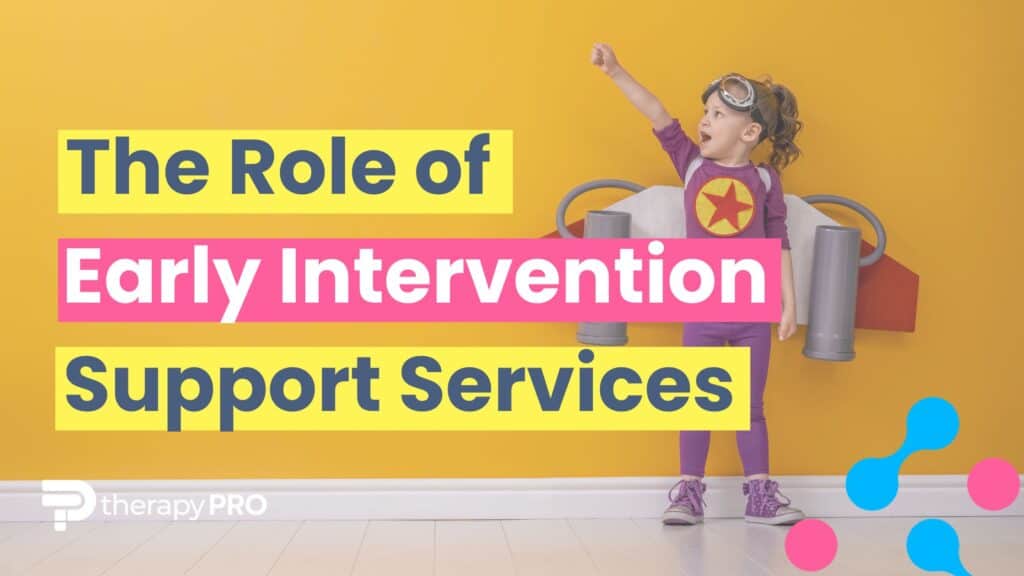The Critical Role of Early Intervention Support Services in Children’s Development
For some parents, the intricacies of early intervention support services and how they could support their child’s development can be a journey filled with questions.
Our Therapy Pro for Kids team understand how therapy for kids can benefit young children. And more so, that the sooner the early intervention support services are put in place, the greater the benefits.
In this article, we’re going to dive into early interventions across a range of therapeutic services to explore the ways they can make a real difference in your child’s life.
Let’s begin.
What are Early Intervention Support Services?
We recognise that every child is unique. And so, the support services they receive must be tailored to their specific developmental needs.
But what exactly do these supports encompass? Let’s look at each of the therapeutic services in more detail and how they impact young children when implemented early.
Speech and Language Therapy
Speech and language pathology plays an invaluable role in early intervention for children displaying communication challenges.
Beyond just helping children articulate words, speech and language therapy aids in fostering effective communication, ensuring that children can interact meaningfully in their daily environments.
For example, a toddler might struggle with asking for a toy or a drink. Through speech therapy, they can learn to voice their desires and needs, making situations like playtime or mealtime less frustrating.
School-aged children might face challenges describing their day, sharing stories, or even making requests in class. Early intervention through speech therapy can bolster their confidence, ensuring they actively participate in classroom discussions, understand, and follow directions during a game, or simply tell their parents about a fun activity they did at school that day.
For children on the autism spectrum, it could mean learning to use words or gestures to indicate wants or desires. This could then lead to a decrease in tantrums caused by communication breakdowns. For more about autism read our comprehensive autism assessment guidelines.
In everyday scenarios, like a day at the park, a child might learn to comment on what they see or ask other children if they can join in a game.
Through the lens of early intervention, speech therapy provides the tools for children to navigate their world, making daily interactions more accessible and enriching.
Occupational Therapy
Occupational therapy as an early intervention for children, supports them should they be struggling with everyday tasks. Its purpose extends far beyond a clinical setting, and touches many routine or daily tasks.
A young child who finds it challenging to hold a pencil properly can be supported through occupational therapy to learn the correct grip and pencil pressure or can be provided with aids to help correct their paper positioning.
For some children, getting dressed independently can be overwhelming. Buttoning shirts, tying shoelaces, or putting on a jacket might demand more coordination than they currently possess. With the aid of occupational therapy, these everyday routines become smoother and easier, thereby growing the child’s self-reliance and confidence.
In school settings, tasks such as organising a backpack, using scissors, or even maintaining appropriate posture can be hurdles. Occupational therapy introduces strategies and exercises that make these tasks more manageable, ensuring the child can focus on learning rather than the challenges.
Children with sensory processing issues might find noisy environments or tactile experiences distressing. Occupational therapists can provide strategies and techniques to help them navigate and even enjoy these experiences.
Occupational therapy, through early intervention, bridges the gaps between capability and daily tasks, allowing children to engage with their world more confidently and independently.
Positive Behaviour Support
At its heart, positive behaviour support isn’t just about managing or mitigating challenging behaviours but understanding and addressing the reasons behind them.
If we consider a young child who consistently throws tantrums during grocery shopping, we might initially assume that it’s the act of shopping that is the root cause of the child’s behaviour. However, through PBS, parents or caregivers might discover that the behaviour is caused by sensory overload from the busy and loud environment. The child’s reaction is a form of communication – their way of saying it’s too much. With this understanding, strategies such as shopping during quieter hours, using noise-cancelling headphones, or incorporating short breaks can be employed.
In school settings, a student might consistently disrupt class not out of defiance, but maybe because they’re struggling to keep up with the lesson or are seated in an area where distractions are high. Behaviour support helps educators and parents identify these triggers and implement classroom strategies like preferential seating, providing summarised instructions, or introducing more hands-on learning for better engagement.
For children with developmental conditions, PBS can be invaluable. If a child becomes distressed during transitions from the playground to the classroom, it may not necessarily be due to defiance, but rather a struggle with adapting to change. With PBS, cues or timers can be introduced, providing a consistent system that a change is imminent, helping the child adjust smoothly.
PBS is about reshaping our understanding of ‘misbehaviour’ and instead of reprimands, it encourages a proactive approach. By identifying and addressing underlying causes, children are not only supported in managing their reactions but are also empowered with tools and strategies to thrive in various situations.
If you’re interested in learning more about PBS, consider coming along to our October Webinar of the Month where we will have one of our Senior PBS Practitioners presenting on the topic.
Psychology
Early psychological interventions empower children to navigate their emotions. Some children may find everyday scenarios challenging and by working with a psychologist they can implement strategies and supports to feel more empowered and in control.
For example, a young child who frequently becomes overwhelmed by emotions and is unable to articulate why they’re upset, might be experiencing anxiety about an upcoming event, school trip, or family gathering. Through the lens of psychology, therapeutic techniques such as talk therapy or cognitive behavioural therapy can be used, allowing the child to recognise, understand, and communicate their feelings, thus easing their anxiety.
In school environments, a student who seems disengaged or constantly ‘daydreaming’ could be grappling with concentration issues, social anxieties, or a learning disorder. Early psychological intervention can unpack these challenges, offering teachers and parents strategies to tailor learning experiences to the child’s unique needs.
For children on the autism spectrum, understanding social cues might be a challenge. They might struggle with reading facial expressions, understanding sarcasm, or setting personal boundaries. Psychology supports can help with social skills or introduction to tools and supports to better understand and manage social interactions.
Psychology, as part of early intervention, is more than just understanding the mind. It’s about ensuring that children are emotionally equipped to navigate the complexities of their daily lives with confidence and understanding. Through therapeutic sessions, children are provided a safe space to express, process, and understand their feelings, ensuring they cope healthily and resiliently.
Social Work
What does a social worker do? A social worker plays an essential role in early intervention by providing a holistic approach to understanding and addressing the unique challenges children and their families face in their day-to-day lives. Social work doesn’t operate in isolation but understands the child within the larger context of family, school, and community.
If we consider a family that has recently relocated, with young children who are struggling to adjust to their new school because they miss their friends or are feeling out of place. A social worker can facilitate smoother transitions, linking the family with community resources, support groups, and school-based programs, making the settling process smoother.
In a school setting, a child who frequently arrives late or seems disengaged might be struggling with family, housing, or domestic challenges. Social workers can work with families to address root causes, and link them with essential resources, ensuring the child’s schooling isn’t disrupted.
In instances where families are navigating complex situations, such as separation, medical challenges, or grief, social workers can offer a range of supports and connect families with specialised services. In this way social workers ensure the emotional and practical needs of both the child and the family are met.
Social work, within the framework of early intervention, is the bridge connecting children and families with the broader community. It’s a multidimensional approach that ensures children and their families are thriving.
The Advantages of Early Intervention
Through their research, observations, and experience allied health professionals report time and again that there are many benefits of early intervention to a child’s development.
During its formative years, the brain exhibits incredible plasticity, meaning that during early childhood, it is particularly receptive to learning and adapting. This makes the early years an ideal time to address developmental challenges.
Let’s take a closer look at why early intervention is so advantageous:
Timeliness is crucial: Early intervention support services are most effective when they begin as soon as a possible developmental delay, or concerning behaviour is observed.
Multiple impacts: Early intervention impacts the immediate issue but is also known to have additional benefits. Children receiving early intervention often exhibit improved social skills, better academic achievements, and heightened emotional resilience compared to their peers who don’t receive timely interventions.
Family-centred approach: Interventions don’t only target the child. Studies have consistently highlighted the ripple effect. Families of children undergoing early interventions often report better coping mechanisms, enhanced understanding of their child’s needs, and improved relationships.
Long-term outcomes: Children who receive early support often carry the advantages into their adolescent and adult years, demonstrating better adaptability and socio-emotional skills.
While interventions are primarily focused on the child, it is often the case that the wider family unit stands to gain.
Therapists and allied health professionals often note that parents and siblings can find themselves better equipped to understand, support, and nurture the child. This in turn fosters a home environment where understanding, compassion, and growth are evident. With their newfound knowledge and resources in hand, families often become advocates themselves, championing awareness and inclusion.
Spotting the Signs and Being Proactive
Every parent knows their child best. But sometimes, it can be hard to tell if your child is just taking a little longer to reach a milestone or if there’s a bigger issue.
Here’s how to spot potential signs and what steps to take next:
Watch and listen: Pay attention to your child’s actions and words. If by a certain age, they aren’t speaking as much as other kids or struggle with tasks like holding a toy or pointing, it might be a sign.
Compare notes: It’s helpful to sometimes compare with other children of the same age. Remember, every child is unique, but big differences might be worth noting.
Ask for advice: If you notice something different, talk to someone. This could be your family doctor, child’s teacher, or a childcare expert. They can offer guidance or suggest if further checks are needed.
Training sessions: There are workshops, webinars, and training available for educators and parents to learn more about spotting signs of developmental delays, including signs of autism. These sessions give you tools and tips to understand your child better.
Take action early: If you feel something’s not right, don’t wait. The earlier you take steps to help your child, the better it is for their growth. This might mean joining a support group, starting therapy, or just getting some advice.
Remember, you’re not alone in this. There’s support out there, and taking the first step can make all the difference for your child.
Your Next Steps for Early Intervention Support Services
In the end, every child is special and takes their own unique path in growing up.
If you’re worried or just curious about your child’s development, don’t hesitate. It’s always a good idea to ask questions and learn more. Early intervention support services are here to help and guide both you and your child. Remember, the sooner you seek support, the better it can be for your little one.
Contact us today to find out if one of our Therapy Pro for Kids team has availability to support you and your child:




